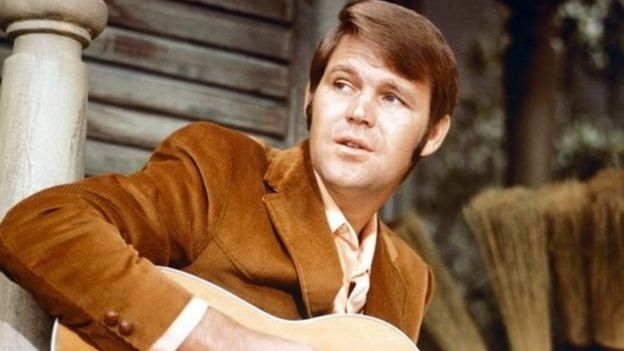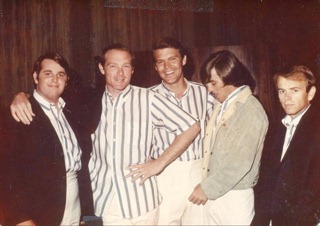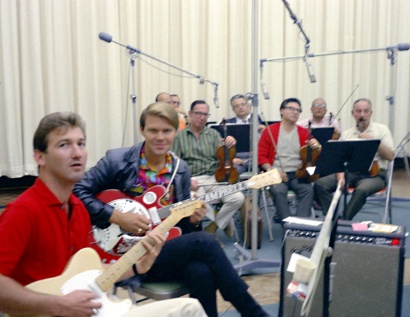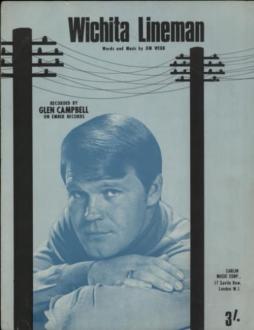The Beach Boys were in a bind.
It was late 1964, nearly three years into their incredible run as Southern California’s favorite sons, providing the soundtrack to the fun-in-the-sun image adored from coast to coast. The fivesome was in the middle of a major tour to capitalize on the strength of their latest #1 single, “I Get Around.” But Brian Wilson — their tenor singer, bass player, chief songwriter, arranger and producer — was a fragile soul, and he had begun to crack under the pressure of all the responsibility. He wanted to withdraw from touring, and concentrate on studio work. What to do?
There was one clear answer: Glen Campbell.
 As a member of the loose group of L.A. session musicians who came to be known as The Wrecking Crew, Campbell had been the guy playing guitar in the recording sessions for “I Get Around,” “Dance, Dance, Dance” and other Beach Boys’ classic records, so he knew the material inside out. He also had a clean-cut look similar to the rest of the group, so he would fit in well on stage. He jumped at the offer and found himself a bonafide Beach Boy for a successful three-month stint.
As a member of the loose group of L.A. session musicians who came to be known as The Wrecking Crew, Campbell had been the guy playing guitar in the recording sessions for “I Get Around,” “Dance, Dance, Dance” and other Beach Boys’ classic records, so he knew the material inside out. He also had a clean-cut look similar to the rest of the group, so he would fit in well on stage. He jumped at the offer and found himself a bonafide Beach Boy for a successful three-month stint.
 After an extraordinarily public six-year battle with Alzheimer’s disease, Campbell died August 9th at age 81. He was widely admired as a dexterous guitarist, a delightful singer, and a hell of a nice guy, and although his star shone brightest in the country music community, his many appearances on the pop charts with iconic songs and on important rock music records certainly qualifies him to be lauded here on Hack’s Back Pages.
After an extraordinarily public six-year battle with Alzheimer’s disease, Campbell died August 9th at age 81. He was widely admired as a dexterous guitarist, a delightful singer, and a hell of a nice guy, and although his star shone brightest in the country music community, his many appearances on the pop charts with iconic songs and on important rock music records certainly qualifies him to be lauded here on Hack’s Back Pages.
Wilson, who had lobbied for Campbell to replace him on that tour fifty-odd years ago, had this to say last week: “Glen was an incredible musician, and an even better person. I’m at a loss. Love and mercy.”
Campbell’s rags-to-riches story is fairly remarkable. He was born in small-town Arkansas in 1936, the seventh son of a dozen children born to John Wesley and Carol Campbell, who barely scraped by farming corn, potatoes and cotton. Glen toiled in the fields throughout his youth, but he idolized his Uncle Boo, who gave him a cheap guitar for Christmas when Glen was five. “Back home, everybody sang along, while somebody played guitar or fiddle or what have you,” Campbell recalled in a 1994 interview.
He practiced guitar relentlessly, listening to radio and records, particularly in awe of the stylings of French-born jazz guitarist Django Reinhardt, a sensation in the 1940s and ’50s. Campbell sang in gospel choirs and played church picnics and county fairs, and by the time he turned 17, he headed for Albuquerque, where he joined his uncle’s band for a spell before forming his own band, The Western Wranglers, playing country-western tunes seven nights a week.
 By 1960, he set his sights on California, settling in Los Angeles just as the recording scene there was catching fire as the new hotbed of rock and roll. He landed a job cutting demos and trying his hand at songwriting for a publishing firm, and his fine guitar work on those demos caught the ear of producers looking for session musicians.
By 1960, he set his sights on California, settling in Los Angeles just as the recording scene there was catching fire as the new hotbed of rock and roll. He landed a job cutting demos and trying his hand at songwriting for a publishing firm, and his fine guitar work on those demos caught the ear of producers looking for session musicians.
It didn’t take long for Campbell and his guitar to start showing up on recordings by some of pop and rock music’s most widely revered artists of the era: Nat King Cole, Elvis Presley, Frank Sinatra, The Beach Boys, Wayne Newton, Bobby Darin, Ricky Nelson, Jan & Dean, Merle Haggard, The Righteous Brothers, The Monkees. Campbell’s assignment was to blend into the arrangement, not grab the spotlight, so you have to listen pretty closely sometimes to hear his contributions, but he’s there on such big hits as “Surf City,” “Danke Schoen,” “You’ve Lost That Lovin’ Feeling,” “Hello Mary Lou,” Presley’s cover of Ray Charles’ “What’d I Say,” “Fun, Fun, Fun,” “Strangers in the Night” and The Monkees’ “I’m a Believer” and “Mary Mary.” Quite a portfolio.
 Not bad, not bad at all. Then, in 1965, Capitol Records heard him sing on a few demos, and signed him as a solo artist. Campbell had grown up on country music and was seen as a potential star in that market. After a couple false starts (anybody heard of “Turn Around, Look at Me” or “”Too Late to Worry”?), they paired him with producer Al DeLory in 1967, who encouraged him to record John Hartford’s song “Gentle On My Mind.”
Not bad, not bad at all. Then, in 1965, Capitol Records heard him sing on a few demos, and signed him as a solo artist. Campbell had grown up on country music and was seen as a potential star in that market. After a couple false starts (anybody heard of “Turn Around, Look at Me” or “”Too Late to Worry”?), they paired him with producer Al DeLory in 1967, who encouraged him to record John Hartford’s song “Gentle On My Mind.”
Although the record stalled at only #30 on the country charts, it would eventually end up winning Grammys for Best Country-Western Recording and Vocal Performance. Meantime, DeLory hurried Campbell back into the studio to record Jimmy Webb’s classic “By the Time I Get to Phoenix,” which not only reached #2 on the country charts but managed #26 on the pop charts. Campbell took many by surprise at those same 1968 Grammys by winning not only Best Male Vocal Performance but also the coveted Album of the Year prize.
This earned him high-profile spots on “The Ed Sullivan Show” and the hip variety show  that followed it on CBS’s Sunday night schedule, “The Smothers Brothers Comedy Hour.” Response to his appearances there was so good that CBS offered him a slot as the Smothers Brothers’ summer replacement with “The Glen Campbell Goodtime Hour,” which stuck around on the full prime-time schedule for three more seasons.
that followed it on CBS’s Sunday night schedule, “The Smothers Brothers Comedy Hour.” Response to his appearances there was so good that CBS offered him a slot as the Smothers Brothers’ summer replacement with “The Glen Campbell Goodtime Hour,” which stuck around on the full prime-time schedule for three more seasons.
There’s an interesting story behind what is considered perhaps Campbell’s finest record, the stunning “Wichita Lineman,” which peaked at #3. DeLory was under pressure to finish Campbell’s next LP and needed another song in a hurry, so they called Webb and asked him to submit “a song about something geographical” by the end of the day. The  previous afternoon, Webb had driven across Kansas and seen a lone telephone lineman working atop a pole in the middle of nowhere, and the image stuck with him. He came up with two verses and the chorus but ran out of time before he could finish it. Nevertheless, Campbell recorded it, using a six-string bass to play the melody line as a solo in place of the missing third verse. It turned out to be one of the song’s most distinctive moments.
previous afternoon, Webb had driven across Kansas and seen a lone telephone lineman working atop a pole in the middle of nowhere, and the image stuck with him. He came up with two verses and the chorus but ran out of time before he could finish it. Nevertheless, Campbell recorded it, using a six-string bass to play the melody line as a solo in place of the missing third verse. It turned out to be one of the song’s most distinctive moments.
“Galveston” was another Top Five hit, but then things leveled off for a few years, even though he enjoyed success on the country charts. Then in the mid-’70s, Campbell was back on top in a big way with two #1s, “Rhinestone Cowboy” (1975) and “Southern Nights” (1977), neither of which appealed to me personally, but they made him a big draw again in concert and on TV, where he often wowed the crowds with phenomenal, quicksilver picking to complement the expected hits.
 Over the years, Campbell has done a stellar job doing polished covers of great songs of the period, even if they weren’t recognized on the charts: “After the Glitter Fades” (Stevie Nicks), “Reason to Believe” (Tim Hardin, Rod Stewart and others), and “The Moon’s a Harsh Mistress” (Jimmy Webb, Judy Collins). Also, other artists were eager to record duets with Campbell over the years as well, from Bobbie Gentry in the ’60s to Tanya Tucker in the ’80s, as well as Cher, Anne Murray, Stevie Wonder, Mel Tillis, Johnny Cash, Lee Greenwood, Juice Newton and Emmylou Harris.
Over the years, Campbell has done a stellar job doing polished covers of great songs of the period, even if they weren’t recognized on the charts: “After the Glitter Fades” (Stevie Nicks), “Reason to Believe” (Tim Hardin, Rod Stewart and others), and “The Moon’s a Harsh Mistress” (Jimmy Webb, Judy Collins). Also, other artists were eager to record duets with Campbell over the years as well, from Bobbie Gentry in the ’60s to Tanya Tucker in the ’80s, as well as Cher, Anne Murray, Stevie Wonder, Mel Tillis, Johnny Cash, Lee Greenwood, Juice Newton and Emmylou Harris.
Make no mistake about this: I am not much of a fan of Campbell’s repertoire, but I’m not part of his demographic, really. Still, I admire his ability to straddle the line between country and pop at a time when that was rarely done. I admire his longevity that made him an exalted country music icon, looked up to by younger generations in the country music arena. And most of all, frankly, I admire “Wichita Lineman.” What a fantastic record.
 The 1980s weren’t so kind to Campbell. The albums and singles he released were met mostly with indifference, even among his base of country fans, and he found himself struggling with alcohol and drug problems for a while. Once he shook that, he re-emerged in the 1990s and 2000s with an array of gospel and Christmas LPs that did modestly well. But clearly, his best days were behind him.
The 1980s weren’t so kind to Campbell. The albums and singles he released were met mostly with indifference, even among his base of country fans, and he found himself struggling with alcohol and drug problems for a while. Once he shook that, he re-emerged in the 1990s and 2000s with an array of gospel and Christmas LPs that did modestly well. But clearly, his best days were behind him.
Once he was diagnosed with Alzheimer’s in 2011, Campbell insisted on publicly announcing it and then embarking on one last “Goodbye” tour. Even though the disease had begun to take its toll, as evidenced by erratic stage behavior and forgotten lyrics, the press and the public praised him for soldiering on, as a way to increase awareness about the disease’s debilitating effects.
Two songs released in Campbell’s twilight years exemplify, in a very poignant way, how the man became a shadow of his former self. First was the 2011 song “Ghost on the Canvas,” a haunting piece that resonates even more now that he has died:
“I know a place between life and death for you and me, let’s take hold on the threshold of eternity, and see the ghost on the canvas, people don’t see us, a ghost on the canvas, people don’t know when they’re looking at souls…”
 Even as Campbell was nearing the end, he collaborated with friend/producer Julian Raymond in 2014 to write and record an extraordinary song, “I’m Not Gonna Miss You,” which was duly noted in the Grammy nominations that year. Its lyrics speak tragically of how, in most cases, the afflicted will ultimately not remember anything or anybody, even cherished loved ones:
Even as Campbell was nearing the end, he collaborated with friend/producer Julian Raymond in 2014 to write and record an extraordinary song, “I’m Not Gonna Miss You,” which was duly noted in the Grammy nominations that year. Its lyrics speak tragically of how, in most cases, the afflicted will ultimately not remember anything or anybody, even cherished loved ones:
“I’m still here, but yet I’m gone, I don’t play guitar or sing my songs, they never defined who I am, the man that loves you ’til the end, you’re the last person I will love, you’re the last face I will recall, and best of all, I’m not gonna miss you…”
Beach Boy Mike Love said he felt a kinship with Campbell, saying he was underrated: “He may not have been a figurehead in rock music, but he made a huge impact in country and pop music, and he is widely revered by axemen everywhere for his virtuoso guitar work, on acoustic and electric alike.”
Rock guitarists from Carlos Santana and Peter Frampton to John Mayer and James Taylor spoke highly of his musical skills as a guitarist and singer. Keith Urban, Vince Gill, Mark Knopfler and George Benson all recall walking away from guitar duels with Campbell, saying, “Whoa! That guy is unbelievable.”
Brad Paisley offered these heartfelt remarks: “Thank you for the artistry, grace and class you brought to country music. You were a shining light in so many ways.”
Tim McGraw added this succinct summary: “In a world of good stuff, his was great. In a world of great stuff, his was special.”
Dear Hack,
Excellent post about a very deserving and talented man. Campbell’s albums were never on the play list for a high school or college party, but his music was inescapable. You heard him on the radio, or any number of TV variety hour programs, including his own, which was a summer substitute for The Smother Brothers. In fact, it was a teenage fan of an earlier Campbell program, The Good Time Hour, who once got to meet Campbell and introduced her father, John Wayne, to the aspiring singer-songwriter.
The outcome of that meeting was Glenn’s appearance in the 1969 classic, True Grit, which won one of them (Wayne) an Oscar. Not that Campbell went without awards! 10 Grammy’s (4 in just 1967), 10 Academy of Country Music awards, three American Music awards, and over a dozen others, including several Lifetime Achievement recognition awards.
As you point out, however, Glenn’s greatest recognition has been the unending tributes pouring in from scores of musicians, singer, entertainers, since the announcement of his passing. He was universally regarded as one of the nicest people in show business. Jimmy Webb, who wrote many of Campbell’s songs, also praised his pure guitar playing skills, even citing that Paul McCartney said Campbell was among the best players. There is a very touching, YouTube clip ( https://www.youtube.com/watch?v=ODAV1XEytfI ) where McCartney comes back stage, after a 2015 Campbell concert, to congratulate him, but it is apparent that Campbell has no clue, at this point, that it’s Paul McCartney. Still very genial, nonetheless.
I will confess that I have only one — a “Greatest Hits” — Campbell CD in my collection. But, like John Denver, and other country/pop crossovers of that time, I always smile when their songs play. They are easy on the ear, usually with rich lyrics, and they are part of the soundtrack of our lives growing up. Nice memories.
Thanks for the post!
Duryea
LikeLiked by 1 person
Many thanks, Duryea! I always appreciate your comments about my blogs — you provide great additional info and observations that I hope other readers see. You’re a good writer — have you thought about starting your own blog?
Rock on!
LikeLike
Thanks Hack for the well deserved tribute to Glen Campbell! “Gentle On My Mind”, “Wichita Lineman” and “Galveston” are all classics! This will continue to be a difficult 10 years or so, as many of our musical heroes pass on. But they leave amazing legacies!
LikeLike